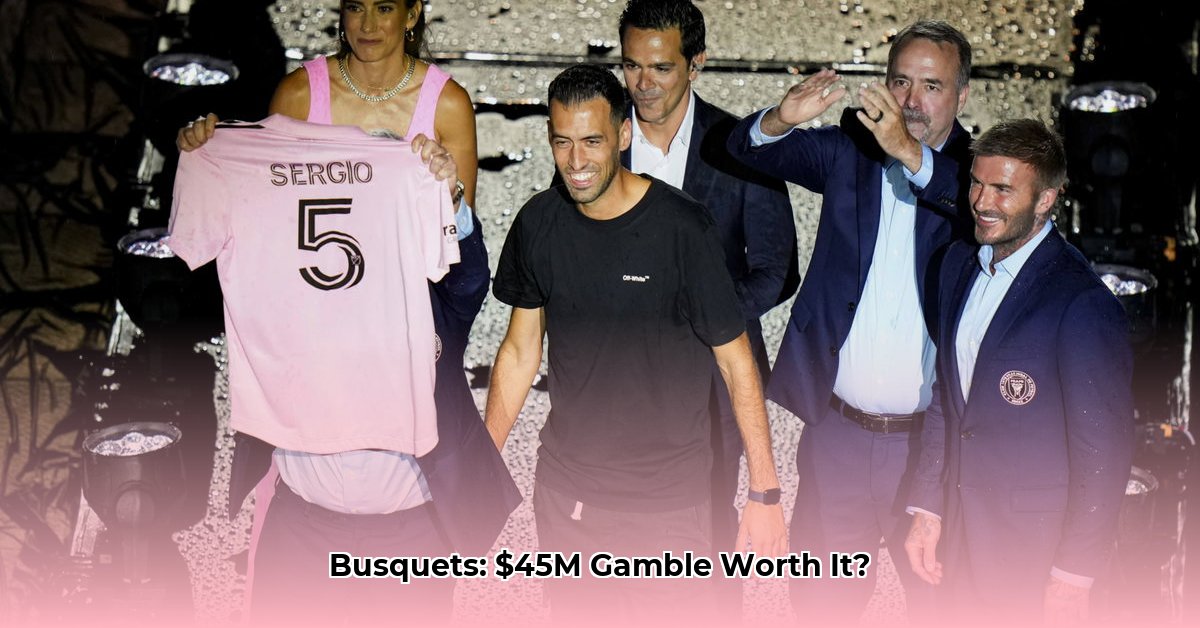
Inter Miami's dramatic transformation into a global soccer powerhouse is undeniable. The arrival of Lionel Messi ignited a frenzy, but the strategic signings of Sergio Busquets and Jordi Alba solidified their status. This article delves into the financial implications of securing Busquets, examining the estimated $45 million investment and assessing its strategic merit. It's not just about Busquets' personal wealth; it's about the calculated risk Inter Miami took, reshaping its financial landscape and future trajectory.
Busquets' Net Worth and Inter Miami's Bold Play
Sergio Busquets' estimated net worth of $45 million reflects a career defined by consistent excellence and global recognition. His signing, alongside Messi and Alba, represents a high-stakes gamble. Inter Miami wasn't just acquiring talent; they were investing in a global marketing phenomenon, aiming for exponential revenue growth. This dramatically altered the club's financial landscape, necessitating careful management of substantial salary expenses alongside the potential for unprecedented revenue streams. Did this strategy pay off? Let's analyze the financial details.
The Messi Effect: A Revenue Tsunami
The arrival of Messi, Alba, and Busquets transcended mere on-field improvements; it sparked a complete rebranding. Ticket sales surged, merchandise flew off shelves, and Inter Miami became a global phenomenon. This increased visibility translated into a flood of new sponsorship opportunities. Major corporations clamored to align their brands with the team's newfound fame, significantly boosting revenue. Merchandise sales soared, creating entirely new revenue channels. However, this success represents a double-edged sword: the club must manage the financial strain of massive salaries while maintaining long-term financial sustainability. This success is a testament to the power of strategic player acquisitions in boosting both on-field performance and financial stability. But what happens when unforeseen events strike?
Navigating Setbacks: The Hong Kong Incident and its Lessons
The cancelled Hong Kong friendly, due to Messi's injury, served as a stark reminder that meticulous planning can't eliminate all risks. Immediate consequences included refunds and disappointed fans. Inter Miami's response, however, was telling. Their open and honest communication with fans, despite the setback, mitigated potential reputational damage, demonstrating the importance of strong crisis management. This incident underscores the necessity of robust risk management strategies that extend beyond player health, safeguarding the club's brand and financial stability. How did this impact the team's bottom line?
Financial Analysis: A High-Stakes Calculation
Inter Miami's investment in star players presents a complex financial equation. While the substantial salaries represent a massive outlay, the potential return is equally significant. Success rests on balancing revenue generation with expenditure. Key factors include:
- Revenue Explosion: Increased fan base translates to significantly higher ticket sales, merchandise sales, and lucrative sponsorship deals.
- Significant Salary Expenses: The hefty salaries of Messi, Alba, and Busquets represent significant ongoing financial commitments.
- Return on Investment (ROI): Precisely tracking revenue increases is critical to assess the success of this high-risk, high-reward strategy. Is the financial risk justified by the increase in profits?
The following table illustrates the potential revenue streams and associated risks:
| Revenue Stream | Short-Term Impact | Long-Term Impact | Potential Risks |
|---|---|---|---|
| Ticket Sales | Massive Increase | Continued High Demand | Player injury, inconsistent team performance |
| Merchandise Sales | Explosive Growth | Potential for sustained high sales | Market saturation, brand fatigue |
| Sponsorship Deals | Major Increase | Long-term partnerships | Market volatility, competition for sponsors |
| Broadcasting Revenue | Significant Increase | Steady Growth | Changes in broadcasting deals, competition for airtime |
Inter Miami's Future: Building a Sustainable Empire
Inter Miami's long-term vision extends beyond short-term gains. The owners aim to leverage the increased popularity and talent to expand internationally, establishing a sustainable youth academy. However, sound financial management is crucial for long-term success. The owners' ability to successfully navigate financial challenges and maintain fiscal responsibility will determine the longevity of this ambitious project and the ultimate profitability of their star player acquisitions, a high-risk, high-reward venture.
Actionable Intelligence Summary
The short-term and long-term implications for stakeholders are substantial:
| Stakeholder | Short-Term Outlook | Long-Term Outlook |
|---|---|---|
| Inter Miami CF Owners | Intense focus on revenue and risk mitigation | Long-term vision: expansion, youth academy development |
| Players | Focus on performance and brand image | Negotiating lucrative contract renewals |
| Sponsors | Assessing ROI, negotiating long-term commitments | Developing extensive marketing collaborations |
| Fans | Thriving on team success and excitement | Continued, passionate fan engagement |
| MLS | Observing Inter Miami's impact on league finances | Potential policy adjustments to accommodate high spending |
In conclusion, Inter Miami's decision to sign Sergio Busquets represents a high-stakes financial gamble. Success hinges not only on on-field performance but also on the club's ability to manage its finances effectively and capitalize on the tremendous opportunities generated by its newfound global popularity. Only time will tell if the $45 million investment in Busquets, a significant portion of his $45 million net worth, will yield lasting success for the club.